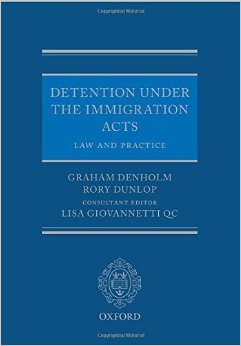- BY Colin Yeo

Review: Detention Under the Immigration Acts by Denholm and Dunlop
THANKS FOR READING
Older content is locked

A great deal of time and effort goes into producing the information on Free Movement, become a member of Free Movement to get unlimited access to all articles, and much, much more
TAKE FREE MOVEMENT FURTHER
By becoming a member of Free Movement, you not only support the hard-work that goes into maintaining the website, but get access to premium features;
- Single login for personal use
- FREE downloads of Free Movement ebooks
- Access to all Free Movement blog content
- Access to all our online training materials
- Access to our busy forums
- Downloadable CPD certificates
What feels like months ago now I was kindly provided with a review copy of Detention Under the Immigration Acts: Law and Practice by Graham Denholm and Rory Dunlop with Lisa Giovannetti QC as Consultant Editor. It has taken me this long to do the actual review because I have not had the chance to use it in anger, so to speak, as I am not currently running any unlawful detention claims. The time has given me the opportunity to dip in and out of the text on a number of occasions, though, and I have been really impressed.
 The book is a relatively slender and paperback volume, which certainly helps with accessibility, and costs a mere £55. If you are involved in an unlawful detention action, or even do immigration bail work, you would be crazy not to buy it at that price. As well as an excellent and clear explanation of the underlying legal principles and powers on immigration detention, the book saves a huge amount of time bringing you up to date with the considerable case law developments on immigration detention issues generally and includes an invaluable section at the end with a description of quantum in publicly available cases. This is a definite improvement on being limited to having a look over old Bhatt Murphy press releases…
The book is a relatively slender and paperback volume, which certainly helps with accessibility, and costs a mere £55. If you are involved in an unlawful detention action, or even do immigration bail work, you would be crazy not to buy it at that price. As well as an excellent and clear explanation of the underlying legal principles and powers on immigration detention, the book saves a huge amount of time bringing you up to date with the considerable case law developments on immigration detention issues generally and includes an invaluable section at the end with a description of quantum in publicly available cases. This is a definite improvement on being limited to having a look over old Bhatt Murphy press releases…
The style is very readable, which is no mean feat for legal topic of this nature and complexity, and the urbane and learned approach of the authors is apparent throughout.
Drilling down a little into some of the chapters that caught my eye, I found the section on the distinction between the modern remedy of application for judicial review and the ancient one of habeas corpus to be very helpful as well as topical, given that we are celebrating the 800th anniversary of Magna Carta.
The chapter on places and conditions of detention is a hugely useful reference point and the material on litigating unlawful detention claims either by way of application for judicial review or by way of an ordinary civil claim will be extremely helpful for those not doing this work day in day out, which is most of us.
Chapter 11 goes through classic categories of person who might be deemed unsuitable for detention, including children, the elderly, pregnant women, those with serious physical or mental medical conditions, victims of trafficking or where there is independent evidence of torture or serious disability. This is extremely useful if you are dealing with any such cases, offering a “one stop shop” reference point for policy and case law. I was a bit surprised not to see more about Rule 35, though, given the deaths in immigration detention that have been occasioned by its being ignored. Reference is also made at chapter 17 but is again rather peremptory.
There are times like this that the origins of the book as the project of a barrister with experience principally in Government work are apparent. Similarly, the slightly short section in chapter 19 on disclosure and the duty of candour and the suggestion that a “similar” duty applies to claimants as well as to the Government is a little surprising and a little weak on authority. Perhaps for the same reason, the book tends a little towards the purely descriptive rather than offering advice or guidance on issues such as the circumstances in which an application for judicial review or a civil claim might be preferable. This is not a fault so much as a feature, though, and it is instructive to read a text on immigration law with considerable input from experienced Treasury Counsel.
Recommended.
SHARE

